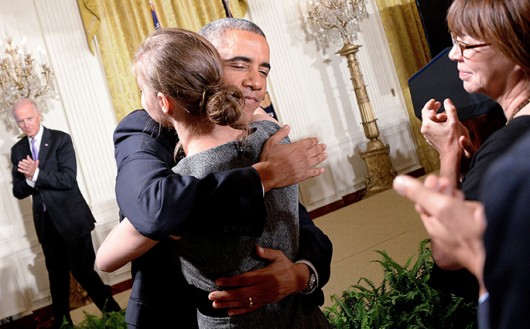
President Barack Obama comforts rape victim Lilly Jay during the launch of the ‘It’s On Us’ campaign at the White House in Washington, D.C., on Sept. 19.
Credit: Courtesy of MCT
What’s new about the president’s new anti-sexual assault campaign “It’s On Us” isn’t that it’s happening.
What is new is who’s talking about it — YouTubers.
Grace Helbig, one of the more popular YouTubers with more than 1.9 million subscribers as of Wednesday evening, was at the White House when the campaign was launched and talked about it on her channel.
And on Sept. 21, Helbig’s friend and fellow YouTuber Hannah Hart who also has more than 1.5 million subscribers to her channel as of Wednesday evening, voiced her discontent with a video British YouTuber Sam Pepper had posted where he sexually harassed women for other peoples’ entertainment.
There is a strategy here. Feminism gets very little attention when it’s a handful of professors in colleges talking about it to their students. Professors can only talk to so many students in their classrooms, more in their careers. More than three million at once? Unlikely.
When Hannah Hart pulls together her friends Mamrie Hart and Grace Helbig — who combined have more than 2.5 million YouTube subscribers and 1 million Twitter followers as of Wednesday evening — and talks about YouTube videos where women are sexually harassed for entertainment, people from middle schoolers to moms notice.
YouTubers are the people who actually can make a difference. These are the people whom both teens and adults respect, and who claim their own forms of feminism. These are the people who can affect the way teenagers think about sexuality and how to act toward others. These are YouTubers that millions relate to, that they line up and pay thousands in airplane fare, hotels and convention tickets to see in person.
YouTube is already affecting the way young people think about sex. Two YouTube channels, Sexplanations by Lindsey Doe, a sexologist, and a second one by Laci Green, a sex education activist, together had 1.2 million subscribers (as of Wednesday evening) and communicate with young people about their sexuality. If YouTube can have that kind of effect just on how people think about sex, what kind of effect can it have on feminism?
President Barack Obama knows the power of YouTube. He knows the real problem with women’s rights isn’t just legal — it’s cultural. It’s embedded in the ways we talk about male and female, in the ways we interact with others.
Because when you change a culture, you change the way people think about their laws, their daily lives, and suddenly, the world changes.


